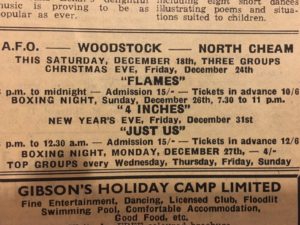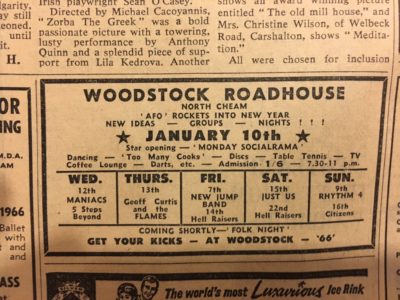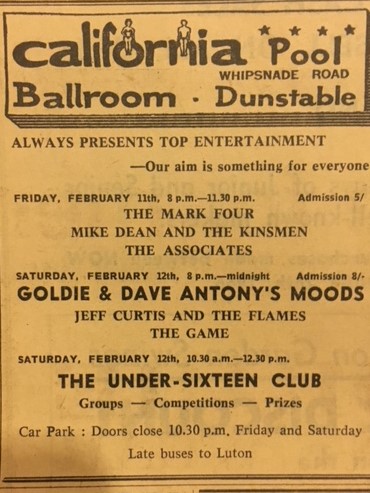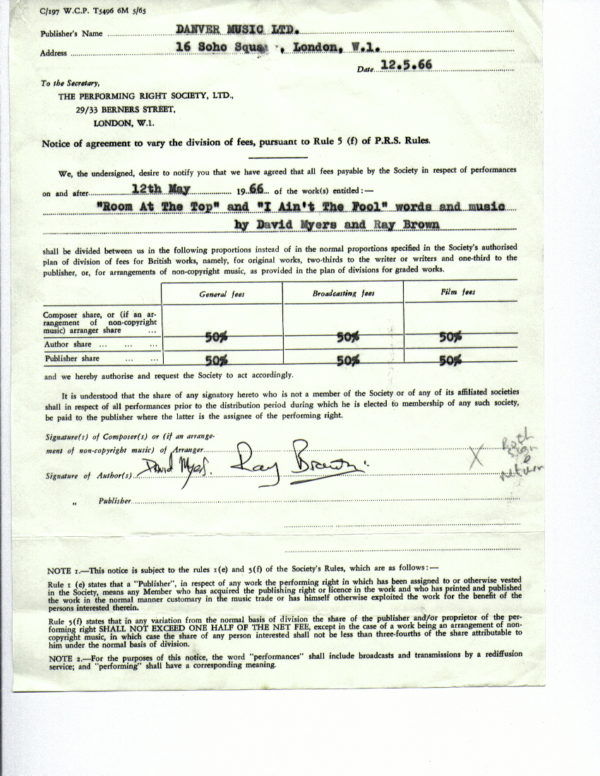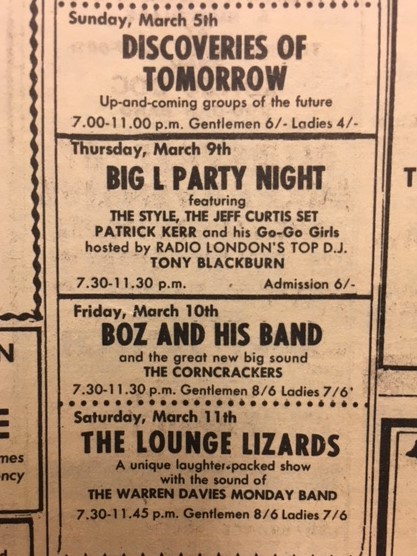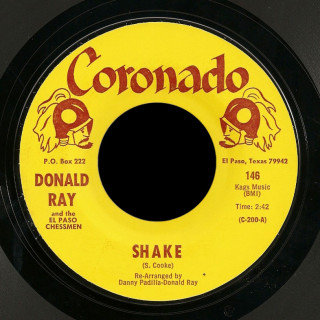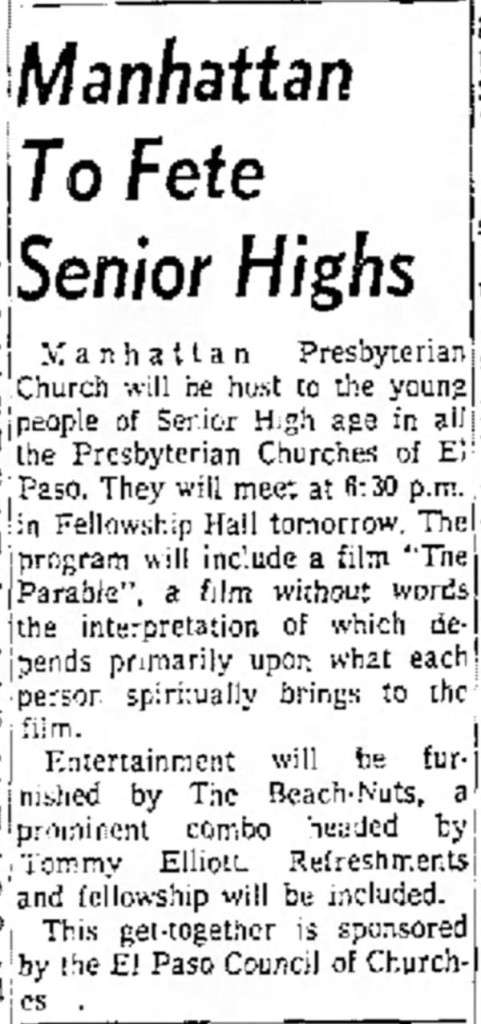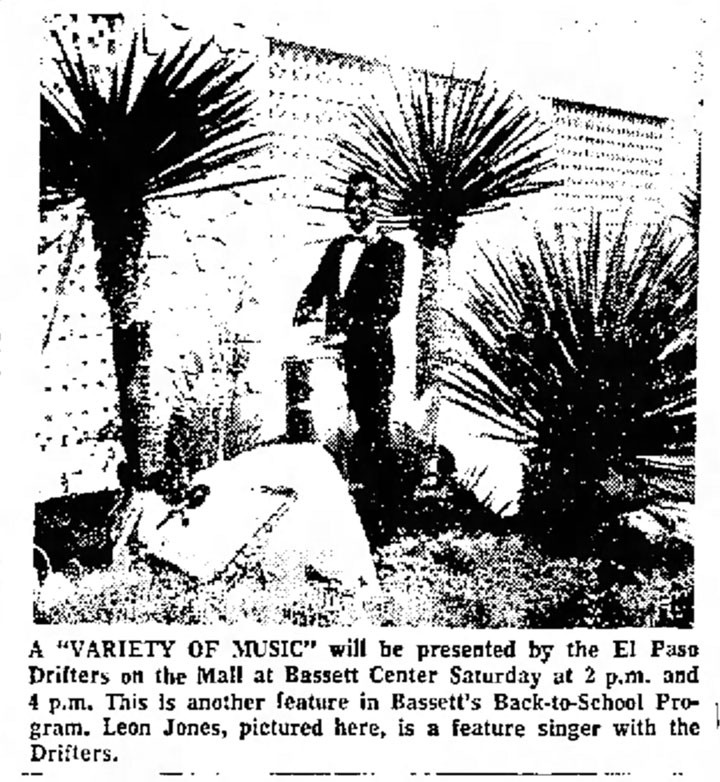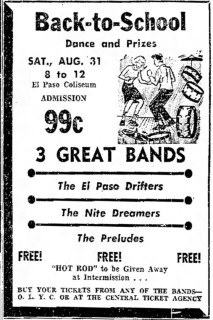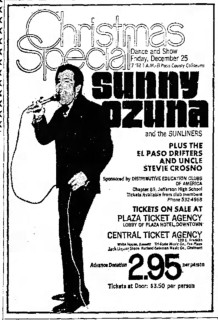
The Ealing Jazz Club (or the Ealing Club as it was more commonly known) was one of London’s most historically important music venues during the 1960s. Situated below the ABC bakery, opposite Ealing Broadway station, in the leafy West London suburb of Ealing, the club became renowned as London’s first significant R&B venue when blues enthusiasts Alexis Korner and Cyril Davies’s band Blues Incorporated debuted in March 1962.
Nicknamed the “Moist Hoist” because of the condensation that used to drip down the walls, the club hosted many of London’s most distinguished R&B acts, and in April of that year provided the setting for the first meeting between Messrs.’ Jagger and Richard and Brian Jones, who formed the nucleus of The Rolling Stones, a club regular during 1962 and 1963.
A virtual who’s who of famous British R&B enthusiasts appeared on the club’s tiny stage over the next three years, most notably Blues Incorporated members Jack Bruce and Ginger Baker (who went on to Cream among others); Eric Clapton; Graham Bond; John Mayall; Long John Baldry; Eric Burdon; and Paul Jones, Manfred Mann’s lead singer, to mention just a few names.
Another of London’s top R&B acts The Who performed their first advertised show at the club in November 1964 and played regularly there during the early part of 1965. Jeff Beck’s band The Tridents also graced the club’s stage and, according to Melody Maker, appeared regularly on the Wednesday and Friday night slots during the summer of 1964.
And let’s not forget Dick Taylor, who left an early incarnation of The Rolling Stones to form his own pioneering R&B band, The Pretty Things. Incidentally, future Rolling Stone, Ron Wood was another famous musician who frequented the club with his band, the unforgettable Birds. His brother, the late Art Wood also appeared there, playing with Blues Incorporated and fronting his own band, The Artwoods.
As an R&B hotbed, the club became a magnet for London’s music crowd, drawing in the likes of Rod Stewart; future Jimi Hendrix drummer Mitch Mitchell; Don Craine and the rest of The Downliners Sect; future Faces keys man Ian McLagan, who was working with Twickenham band, The Muleskinners; and future Deep Purple founder Nick Simper, whose early Sixties outfit, The Delta Five were one of the many acts to appear.
Many of the British musicians that either played at the club or witnessed the burgeoning R&B scene emerging from it, took what they had learnt and/or seen to overseas markets as part of the British invasion.
Locals, the late Frank Kennington, who later managed Motorhead, and lead guitarist Mick Liber, whose band Frankie Reid and The Casuals (with future Episode Six drummer John Kerrison among others) had played at the Ealing Club, headed Down Under and formed one of Australia’s finest R&B groups, the original Python Lee Jackson.
Singer Andy Keiller caught many of the acts, including an embryonic Rolling Stones with Carlo Little on drums and Ricky Brown on bass and was so inspired that he headed off to South Africa and subsequently formed The Upsetters in late 1965.
Keiller’s soon-to-be collaborator, Irish guitarist Louis McKelvey and his friend, drummer Malcolm Tomlinson, meanwhile, had played with Jeff Curtis & The Flames, who frequently played at the Ealing Club during its formative years.
After their brief stint together in South Africa, Andy Keiller and Louis McKelvey amazingly reunited in Canada in the late 1960s, founding the experimental band, Influence.
McKelvey subsequently returned to the UK to pick up Malcolm Tomlinson, who’d been working with a pre-Jethro Tull Martin Barre and then headed back to Toronto to form Milkwood, authors of a soon-to-be released LP, recorded with the legendary Jerry Ragovoy at the NYC’s Hit Factory in summer of 1969.
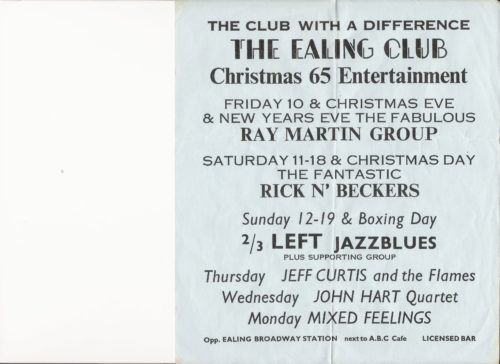 Likewise, many other not so famous musicians who played the Ealing Club went on to produce fascinating music in the burgeoning psychedelic scene. Locals Chris Jackson and Tom Newman fronted R&B band The Tomcats (who also worked as The Thoughts) and later formed one of Britain’s more interesting psych ventures, July, after a stint in Spain.
Likewise, many other not so famous musicians who played the Ealing Club went on to produce fascinating music in the burgeoning psychedelic scene. Locals Chris Jackson and Tom Newman fronted R&B band The Tomcats (who also worked as The Thoughts) and later formed one of Britain’s more interesting psych ventures, July, after a stint in Spain.
Jon Field and Tony Duhig were also members of July and had earlier worked with another Ealing Club regular – The Second Thoughts, alongside future Thunderclap Newman, drummer/vocalist Speedy Keen and Patrick Campbell Lyons, who later formed the core of another top psych act, Nirvana.
Jimmy Royal, yet another local talent, was a club regular and fronted one of the area’s most respected bands, The Hawks, which featured former Cliff Bennett & The Rebel Rousers (the recently deceased) guitarist Mick King (real name Mick Borer) and drummer Terry Mabey among others.
And let’s not forget the many obscure bands that got to play at this prestigious club – groups like The Fairlanes, The Four Sounds, Johnnie Harris and The Shades and The Fantastic Soul Messengers.
With many of these great musicians already gone, Garagehangover would like to use this space to encourage musicians, club regulars, promoters and any others with any memories, memorabilia, photos and details of live dates to share this on the site in the comment box below.
Unless otherwise stated, the following (incomplete) gigs listing is from the Middlesex County Times & West Middlesex Gazette, which advertised who played at the Ealing Club in its “Coming Events” section towards the back.
The main exception is 1963 where Melody Maker was the main source for gigs unless otherwise noted.
Thanks to Paul Lucas for The Tridents’ gigs, taken from his diary.
January 1963 (only part of this month has listings)
Friday 11 – The London City Stompers (Harrow Observer & Gazette)
Friday 18 – The Ken Stuart Seven
Tuesday 22 – The Colne Valley Six
Saturday 26 – The Rolling Stones
February 1963 (only part of this month has listings)
Keith Gardiner, rhythm guitar player with Jeff Curtis & The Flames, says his band played the Ealing Club a few times during the early months of 1963
Tuesday 5 – The Rolling Stones
Friday 8 – Blue Cedar Jazzmen (Harrow Observer & Gazette)
Saturday 9 – The Rolling Stones
Friday 15 – Johnny Toogood’s Jazzband (Harrow Observer & Gazette)
Saturday 16 – The Rolling Stones
Friday 22 – Colne Valley Six (Harrow Observer & Gazette)
Saturday 23 – The Rolling Stones
March 1963 (only part of this month has listings)
Friday 1 – Eric Johnson’s Junction Jazz Band
Saturday 2 – The Rolling Stones
According to John Kerrison’s autobiography It Ain’t Rock ‘N’ Roll, The Rolling Stones had a regular Thursday night residency, which Kerrison’s band, Frankie Reid & The Casuals took over. Judging by the dates, it looks more likely that it was a Saturday rather than Thursday night residency.
Friday 8 – Kid Martyn’s Ragtime Band
Monday 11 – The Rockets (Harrow Observer & Gazette)
Saturday 16 – The Rolling Stones (Harrow Observer & Gazette)
Monday 18 – The Rocket Men (Harrow Observer & Gazette)
Friday 22 – Thames City Jazzmen
Saturday 23 – Blues By Six (Harrow Observer & Gazette)
Sunday 24 – Sonny Morris Veterans Jazz Band
Monday 25 – The Rocket Men (Harrow Observer & Gazette)
Friday 29 – Bob Woolley’s Jazz Band
Saturday 30 – The Rolling Stones (Harrow Observer & Gazette)
Sunday 31 – Micky Ashman’s Ragtime Jazz Band
April 1963 (only part of this month has listings)
Monday 1 – The Rocket Men (Harrow Observer & Gazette)
Friday 5 – The Cardinal Jazzmen
Friday 12 – Keith Smith’s Climax Jazzband (Harrow Observer & Gazette)
Saturday 13 – The Rolling Stones (Harrow Observer & Gazette)
Monday 15 – The Rocket Men (Harrow Observer & Gazette)
Thursday 18 – Jimmy Royal & The Hawks (Harrow Observer & Gazette)
Saturday 20 – The Rolling Stones (Harrow Observer & Gazette)
Monday 22 – The Rocket Men (Harrow Observer & Gazette)
Thursday 25 – Jimmy Royal & The Hawks (Harrow Observer & Gazette)
Friday 26 – Bob Woolley’s Jazzmen
Saturday 27 – The Rolling Stones (Harrow Observer & Gazette)
Sunday 28 – Mann-Hugg Blues Band (This was the first Ealing Club show by the band that became Manfred Mann)
Monday 29 – The Rocket Men (Harrow Observer & Gazette)
May 1963 (only part of this month has listings)
Friday 3 – The Sidewalk Six and The Phoenix Thumpers
Sunday 5 – The Mann-Hugg Blues Band
Thursday 9 – Jimmy Royal & The Hawks (Harrow Observer & Gazette)
Friday 10 – The Cardinal Jazzmen
Saturday 11 – The Rolling Stones (Harrow Observer & Gazette)
Sunday 12 – The Mann-Hugg Blues Band
Monday 13 – Rock ‘N’ Roll (Harrow Observer & Gazette)
Friday 17 – The Dauphine Street Six
Sunday 19 – The Mann-Hugg Blues Band
Thursday 23 – Frankie Reid & The Casuals (Harrow Observer & Gazette) (Members at this time went on to Python Lee Jackson and Episode Six)
Friday 24 – Douggie Richford’s Jazzmen
Saturday 25 – The Rolling Stones (Harrow Observer & Gazette)
Sunday 26 – The Mann-Hugg Blues Band
Monday 27 – The Running Gate (Harrow Observer & Gazette)
Friday 31 – The Dolphin Jazz Band
June 1963 (only part of this month has listings)
Sunday 2 – The Mann-Hugg Blues Band
Sunday 9 – The Mann-Hugg Blues Band
Tuesday 11 – The Boys and The Henchman (Harrow Observer) (The Boys became The Action; The Henchmen evolved into The Rockin’ Eccentrics – see below)
Thursday 13 – Frankie Reid & The Casuals and Jimmy Royal & The Hawks (Harrow Observer & Gazette)
Friday 14 – The Cardinal Jazzmen
Saturday 15 – Graham Bond (Harrow Observer & Gazette)
Sunday 16 – The Mann-Hugg Blues Band (Harrow Observer & Gazette has them billed as The Blues Brothers but also lists The Chinese Blues and Manhogs)
Monday 17 – The Boys and The Henchmen (Harrow Observer & Gazette)
Thursday 20 – Frankie Reid & The Casuals and Jimmy Royal & The Hawks (Harrow Observer)
Friday 21 – Charlie Gall’s Jazz Band
Saturday 22 – The Graham Bond Quartet
Sunday 23 – The Mann-Hugg Blues Band (Harrow Observer & Gazette bill them as fabulous Rolling Blues Brothers)
Monday 24 – The Henchmen (Harrow Observer & Gazette)
Friday 28 – Bob Wooley’s Jazz Band
Sunday 30 – The Mann-Hugg Blues Band
July 1963 (only part of this month has listings)
Friday 5 – The Renegades (Harrow Observer & Gazette has The Limelights)
Sunday 7 – The Mann-Hugg Blues Band (This was the final gig under this name before switching to Manfred Mann)
Wednesday 10 – The Soundsmen (Harrow Observer & Gazette)
Friday 12 – The Limelights (this band became The Legends)
Wednesday 17 – Mike Forde & The Fortunes (Drummer Lindsay Bex joined The Tridents in January 1964 but left soon after Jeff Beck joined)
Friday 19 – The Limelights
Wednesday 24 – The International Monarchs
August 1963 (only part of this month has listings)
Friday 2 – The Limelights
Wednesday 7 – Alexis Korner’s Blues Incorporated
Wednesday 28 – Blues by Six
September 1963 (only part of this month has listings)
Wednesday 4 – The Graham Bond Quartet
October 1963 (only part of this month has listings)
Saturday 5 – Manfred Mann (First Ealing gig under their new name)
Wednesday 16 – The Bluenotes
November 1963 (only part of this month has listings)
Saturday 9 – Manfred Mann
Saturday 30 – Manfred Mann
December 1963 (only part of this month has listings)
Sunday 1 – The Fantastic Soul Messengers (billed as every Sunday) (Mitch Mitchell played drums at the start alongside sax player Terry Marshall, who was Jim Marshall’s son)
Sunday 8 – The Fantastic Soul Messengers
Saturday 14 – Manfred Mann
Sunday 15 – The Fantastic Soul Messengers
Saturday 21 – Manfred Mann
Sunday 22 – The Fantastic Soul Messengers
Sunday 29 – The Fantastic Soul Messengers
January 1964 (only part of this month has listings)
Saturday 4 – John Mayall’s Bluesbreakers (billed as playing every Saturday)
Friday 10 – The Tridents (Guitarist Leslie Jones joined Four Plus One in August 1964 with former Tridents drummer Ken Lawrence; they became The In Crowd who subsequently morphed into Tomorrow)
Saturday 11 – Possibly John Mayall’s Bluesbreakers (needs confirmation)
Monday 13 – The Tridents
Saturday 18 – John Mayall’s Bluesbreakers
Monday 20 – Mitz Mitton New Orleans Jazz Band (billed as every Monday)
Wednesday 22 – The Tridents
Thursday 23 – Jimmy Royal & The Hawks (Harrow Observer & Gazette)
Saturday 25 – John Mayall’s Bluesbreakers
Sunday 26 – The Soul Messengers (Harrow Observer & Gazette)
Monday 27 – Mitz Mitton New Orleans Jazz Band
Wednesday 29 – The Tridents
Thursday 30 – The Chessmen (Harrow Observer & Gazette) (aka Tony Knight’s Chessmen)
February 1964 (only part of this month has listings)
Saturday 1 – The Soul Messengers (Harrow Observer & Gazette)
Sunday 2 – Frankie Reid & The Casuals (Harrow Observer & Gazette)
Monday 3 – Mitz Mitton New Orleans Jazz Band
Thursday 6 – The Chessmen
Friday 7 – The Tridents
Saturday 8 – The Soul Messengers (Melody Maker however lists John Mayall’s Bluesbreakers)
Sunday 9 – Frankie Reid & The Casuals
Monday 10 – Mitz Mitton New Orleans Jazz Band
Wednesday 12 – The Tridents
Wednesday 19 – The Tridents
Wednesday 26 – The Tridents
March 1964 (only part of this month has listings)
Wednesday 4 – The Tridents
Friday 6 – R&B group

Wednesday 11 – The Tridents
Friday 13 – R&B group
Wednesday 18 – The Tridents
Thursday 19 – Top West London groups (Harrow Observer & Gazette)
Saturday 21 – Jimmy Williamson Trio (Harrow Observer & Gazette)
Sunday 22 – The Soul Messengers (Harrow Observer & Gazette)
Monday 23 – Mitz Mitton New Orleans Jazz Band (Harrow Observer & Gazette)
Wednesday 25 – The Tridents
Thursday 26 – Jeff Curtis & The Flames (Ruislip & Northwood Gazette) (Members at this point went on to The Manchester Playboys, Influence and The Penny Peeps among others)
Friday 27 – The Tridents
Saturday 28 – John Mayall’s Bluesbreakers (Ruislip & Northwood Gazette)
Sunday 29 – The Soul Messengers (Ruislip & Northwood Gazette)
Monday 30 – Mitz Mitton New Orleans Jazz Band
April 1964
Wednesday 1 – The Tridents
Thursday 2 – Jeff Curtis & The Flames
Friday 3
Saturday 4 – John Mayall’s Bluesbreakers
Sunday 5 – The Soul Messengers
Monday 6
Tuesday 7
Wednesday 8 – The Tridents
Thursday 9 – Geoff Cortez & The Flame (This is Jeff Curtis & The Flames) (Harrow Observer & Gazette)
Friday 10 – R&B group
Saturday 11 – The Soul Messengers (Harrow Observer & Gazette)
Sunday 12 – The Second Thoughts (Harrow Observer & Gazette) (Members went on to Nirvana, Thunderclap Newman, July and Jade Warrior)
Monday 13 – Mitz Mitton New Orleans Jazz Band
Tuesday 14
Wednesday 15
Thursday 16 – Geoff Cortez & The Flame (sic) (this is Jeff Curtis & The Flames)
Friday 17
Saturday 18 – The Mark Leeman Five (Harrow Observer & Gazette) (Members went on to The Nice, Gass and Herbie Goins & The Night-Timers among others)
Sunday 19 – The Second Thoughts
Monday 20 – The Casuals (Most likely Frankie Reid & The Casuals) (Melody Maker lists Mitz Mitton New Orleans Jazz Band on Monday, 20 April)
Tuesday 21
Wednesday 22

Thursday 23 – Jeff Curtis & The Flames (Harrow Observer & Gazette)
Friday 24
Saturday 25 – John Mayall’s Bluesbreakers (Harrow Observer & Gazette)
Sunday 26 – The Second Thoughts
Monday 27 – The Casuals (Most likely Frankie Reid & The Casuals)
Tuesday 28
Wednesday 29 – The Tridents
Thursday 30 – Jeff Curtis & The Flames
May 1964
Friday 1
Saturday 2 – John Mayall’s Bluesbreakers
Sunday 3 – The Fabulous Second Thoughts (This is The Second Thoughts)
Monday 4
Tuesday 5
Wednesday 6 – The Tridents
Thursday 7 – Jimmy Royal & The Hawks (aka James Royal & The Hawks)
Friday 8 – R&B group
Saturday 9 – The Mark Leemen Five
Sunday 10 – The Second Thoughts
Monday 11 – The Soul Messengers (Mitch Mitchell left before the band became The Next 5 in the summer. After playing a gig with The Rockin’ Eccentrics in Portsmouth, he formed The Riot Squad)
Tuesday 12
Wednesday 13 – The Tridents
Thursday 14 – Jimmy Royal & The Hawks (aka James Royal & The Hawks)
Friday 15
Saturday 16 – The Mark Leemen’s Five (aka Mark Leemen Five)
Sunday 17 – Fabulous Second Thoughts (This is The Second Thoughts)
Monday 18 – The Hobos
Tuesday 19
Wednesday 20
Thursday 21 – Jimmy Royal & The Hawks (aka James Royal & The Hawks)
Friday 22
Saturday 23 – The Mark Leemen Five
Sunday 24 – The Second Thoughts
Monday 25 – The Hobos
Tuesday 26
Wednesday 27
Thursday 28 – Jimmy Royal & The Hawks (aka James Royal & The Hawks
Friday 29 – The Tridents
Saturday 30 – The Mark Leemen Five
Sunday 31 – The Second Thoughts
June 1964
Monday 1 – The Hobos
Tuesday 2
Wednesday 3 – The Tridents
Thursday 4 – Manfred Mann
Friday 5 – The Tridents

Saturday 6 – The Mark Leemen Five
Sunday 7 – The Second Thoughts
Monday 8 – The Hobos
Tuesday 9
Wednesday 10 – The Tridents
Thursday 11 – Manfred Mann (Harrow Observer & Gazette has Frankie Reid & The Casuals)
Friday 12 – The Preachers (Terry Clark and Andy Bown went on to original line up of The Herd)
Saturday 13 – The Mark Leemen Five (This might have been The Tridents; Harrow Observer & Gazette lists the latter)
Sunday 14 – The Second Thoughts
Monday 15 – The Hobos
Tuesday 16
Wednesday 17 – The Tridents
Thursday 18 – Frankie Reid & The Casuals (Members at this point went on to Python Lee Jackson and Episode Six among others)
Friday 19 – The Fairlanes
Saturday 20 – The Tridents (Harrow Observer & Gazette lists The Mark Leeman Five)
Sunday 21 – The Second Thoughts
Monday 22 – The Hobos
Tuesday 23
Wednesday 24 – The Tridents
Thursday 25 – Frankie Reid & The Casuals
Friday 26 – Gene & The Cossacks
Saturday 27– The Mark Leemen Five
Sunday 28 – The Second Thoughts
Monday 29 – The Hobos
Tuesday 30
July 1964
Wednesday 1 – The Tridents
Thursday 2 – Frankie Reid & The Casuals
Friday 3 – R&B group
Saturday 4 – The Mark Leemen Five
Sunday 5 – The Second Thoughts
Monday 6 – The Hobos
Tuesday 7
Wednesday 8
Thursday 9 – Frankie Reid & The Casuals
Friday 10 – The Tridents
Saturday 11 – Mark Lemon (sic) – (This is The Mark Leeman Five)
Sunday 12 – The Second Thoughts
Monday 13 – The Hobos
Tuesday 14
Wednesday 15 – The Tridents
Thursday 16 – Frankie Reid & The Casuals
Friday 17 – R&B
Saturday 18 – Mark Lemon (sic) – (This is The Mark Leemen Five) (Harrow Observer & Gazette has The Second Thoughts)
Sunday 19 – The Second Thoughts
Monday 20 – Gerry Hart & The Heartbeats (This group became The Eyes)
Tuesday 21
Wednesday 22
Thursday 23 – Frankie Reid & The Casuals
Friday 24
Saturday 25 – The Second Thoughts (Harrow Observer & Gazette has The Mark Leeman Five)

Sunday 26 – The Second Thoughts (Harrow Observer & Gazette has The Macabre)
Monday 27 – The Hobos
Tuesday 28
Wednesday 29 – The Tridents
Thursday 30 – Frankie Reid & The Casuals
Friday 31 – R&B
August 1964
Saturday 1 – The Mark Leemen Five
Sunday 2 – The Macabre (Guitarist Peter Vernon-Kell had been a very early member of The Who when they were called The Detours. He would go to become an original member of The Hamilton Movement)
Monday 3 – R&B (possibly The Hobos)
Tuesday 4
Wednesday 5 – The Tridents
Thursday 6 – R&B
Friday 7 – Group Four
Saturday 8 – R&B (possibly The Mark Leemen Five)
Sunday 9 – R&B (possibly The Macabre)
Monday 10 – R&B (possibly The Hobos)
Tuesday 11
Wednesday 12 – The Tridents
Thursday 13 – R&B
Friday 14 – The Koalas
Saturday 15 – R&B (possibly The Mark Leemen Five)
Sunday 16 – R&B (possibly The Macabre)
Monday 17 – R&B (possibly The Hobos)
Tuesday 18
Wednesday 19 – The Tridents (Shortly after this gig, the band’s guitarist Leslie Jones left to join Four Plus One/The In Crowd and Mike Jopp covered until Jeff Beck joined in early September)
Thursday 20 – R&B
Friday 21 – The Preachers
Saturday 22 – R&B (possibly The Mark Leemen Five)
Sunday 23 – R&B (possibly The Macabre)
Monday 24 – R&B (possibly The Hobos)
Tuesday 25
Wednesday 26 – R&B
Thursday 27 – R&B
Friday 28 – R&B
Saturday 29 – R&B (possibly The Mark Leemen Five)
Sunday 30 – R&B (possibly The Macabre)
Monday 31 – R&B (possibly The Hobos)
September 1964
Tuesday 1
Wednesday 2 – R&B
Thursday 3 – R&B
Friday 4 – R&B
Saturday 5 – R&B (possibly The Mark Leemen Five)
Sunday 6 – R&B (possibly The Macabre)
Monday 7 – R&B (possibly The Hobos)
Tuesday 8
Wednesday 9 – R&B
Thursday 10 – Frankie Reid & The Casuals (guest star Jimmy Royal) (Harrow Observer & Gazette)
Friday 11 – R&B
Saturday 12 – The Mark Leemen Five (Saturdays)
Sunday 13 – The Macabre (Sundays)
Monday 14 – The Hobos (Mondays)
Tuesday 15
Wednesday 16 – Buddy Britten & The Regents (every Wednesday)
Thursday 17 – Frankie Reid & The Casuals (guest star Jimmy Royal)
Friday 18 – The Preachers

Saturday 19 – The Mark Leemen Five
Sunday 20 – The Macabre
Monday 21 – The Hobos
Tuesday 22
Wednesday 23 – Buddy Britten & The Regents
Thursday 24 – Jimmy Royal & The Hawks and Frankie Reid & The Casuals
Friday 25 – The Vincents

Saturday 26 – The Mark Leemen Five (Harrow Observer & Gazette)
Sunday 27 – John Mayall’s Bluesbreakers and The Mokes (Harrow Observer & Gazette)
Monday 28 – The Macabre (Harrow Observer & Gazette)
Tuesday 29
Wednesday 30 – Buddy Britten & The Regents (Harrow Observer & Gazette)
October 1964
Thursday 1 – The Next 5 (needs confirmation)
Friday 2 – The Cobwebs and The RBQ
Saturday 3 – The Mark Leemen Five
Sunday 4 – The Hobos
Monday 5 – The Macabre
Tuesday 6
Wednesday 7 – R&B
Thursday 8 – The Next 5 (Formerly The Soul Messengers but with personnel changes)
Friday 9 – R&B
Saturday 10 – The Birds (Ronnie Wood on lead guitar)
Sunday 11 – The Hobos
Monday 12 – The Macabre
Tuesday 13
Wednesday 14 – R&B
Thursday 15 – The Next 5
Friday 16 – The Fairlanes
Saturday 17 – The Mark Leehan Five (sic) (This is The Mark Leemen Five)
Sunday 18 – John Mayall’s Bluesbreakers
Monday 19 – The Dee Lobs
Tuesday 20
Wednesday 21 – R&B
Thursday 22 – The Next 5
Friday 23 – R&B
Saturday 24 – The Mark Leehan Five (sic) (This is The Mark Leemen Five)
Sunday 25 – John Mayall’s Bluesbreakers (Harrow Observer & Gazette)
Monday 26 – The Dee Lobs
Tuesday 27
Wednesday 28 – R&B
Thursday 29 – The Next 5
Friday 30 – The Miston Tuac
Saturday 31 – The Mark Leehan Five (sic) (This is The Mark Leemen Five)
November 1964
Sunday 1 – The Hobos and John Mayall’s Bluesbreakers (Harrow Observer & Gazette)
Monday 2 – The Dee Lobs
Tuesday 3
Wednesday 4 – The Inclined
Thursday 5 – The Next 5
Friday 6
Saturday 7 – The Mark Leemen Five
Sunday 8 – The Hobos
Monday 9 – The Dee Lobs
Tuesday 10
Wednesday 11
Thursday 12 – Jimmy Royal & The Hawks
Friday 13
Saturday 14 – The Mark Leemen Five
Sunday 15 – The Dee Lobs
Monday 16 – The De’ils (possibly The Devils)
Tuesday 17
Wednesday 18
Thursday 19 – Jimmy Royal & The Hawks
Friday 20 – The Deacons

Saturday 21 – The High Numbers (The Who) (Documented as club debut but may not be)
Sunday 22 – The Dee Lobs
Monday 23 – The De’els (possibly The Devils)
Tuesday 24
Wednesday 25
Thursday 26 – Jimmy Royal & The Hawks
Friday 27
Saturday 28 – The Mark Leemen Five
Sunday 29 – The South West Five (This was probably before Arthur Brown joined on vocals)
Monday 30 – The Rockin’ Eccentrics
December 1964
Tuesday 1
Wednesday 2 – The Inclined
Thursday 3 – The Rockin’ Eccentrics (Harrow Observer & Gazette)
Friday 4 – The Heart & Souls
Saturday 5 – The Mark Leemen Five
Sunday 6 – The South West Five
Monday 7 – The Dee Lobs
Tuesday 8
Wednesday 9
Thursday 10 – The Rockin’ Eccentrics
Friday 11
Saturday 12 – The Limelights
Sunday 13 – The Mark Leemen Five
Monday 14 – The Dee Lobs
Tuesday 15
Wednesday 16 – Alexis Korner

Thursday 17 – The Rockin’ Eccentrics
Friday 18
Saturday 19 – Jeff Curtis & The Flames and The Hobos (Harrow Observer & Gazette has The Limelights)
Sunday 20 – The Mark Leemen Five
Monday 21 – The Dee Lobs
Tuesday 22
Wednesday 23 – possibly Alexis Korner (needs confirmation)

Thursday 24 – The Rockin’ Eccentrics and The South West Five
Friday 25
Saturday 26 – The Mark Leemen Five and The Hobos
Sunday 27 – The Who
Monday 28 – The Dee Lobs
Tuesday 29
Wednesday 30 – Alexis Korner (Harrow Observer & Gazette)
Thursday 31 – The Rockin’ Eccentrics and The South West Five
January 1965
Friday 1
Saturday 2 – The Who
Sunday 3 – The Hobos
Monday 4 – The Dee Lobs
Tuesday 5
Wednesday 6 – Alexis Korner
Thursday 7 – The Rockin’ Eccentrics (Ruislip & Northwood Gazette)
Friday 8 – The Heart & Souls (According to Ken Samuels, this was possibly with Flight One)
Saturday 9 – The Who
Sunday 10 – The Mark Leemen Five
Monday 11 – The Dee Lobs
Tuesday 12
Wednesday 13 – Alexis Korner
Thursday 14 – The Rockin’ Eccentrics
Friday 15 – Beau & The Odd Lot
Saturday 16 – The Ray Martin Group (Terry Marshall, Jim’s Marshall’s son was a member)
Sunday 17 – The Mark Leemen Five
Monday 18 – The Dee Lobs
Tuesday 19
Wednesday 20 – Alexis Korner
Thursday 21 – The Rockin’ Eccentrics
Friday 22 – Just Memphis
Saturday 23 – The Ray Martin Group
Sunday 24 – The Mark Leemen Five
Monday 25 – The Dee Lobs
Tuesday 26
Wednesday 27 – Alexis Korner
Thursday 28 – The Rockin’ Eccentrics
Friday 29 – The Nature Boys
Saturday 30 – The Who
Sunday 31 – The Ray Martin Group
February 1965
Monday 1 – The Dee Lobs
Tuesday 2
Wednesday 3
Thursday 4 – The Rockin’ Eccentrics (and Jimmy Royal & The Hawks?)
Friday 5 – Wainwright’s Gentlemen (Ian Gillan on lead vocals) and The Unit 5
Saturday 6 – The Ray Martin Group
Sunday 7 – Group Competition – 5 Top Groups!
Monday 8 – The Dee Lobs
Tuesday 9
Wednesday 10 – Unit 5 (Harrow Observer & Gazette)

Thursday 11 – The Who (Billed as “The Who London 1965” for next four Thursdays)
Friday 12 – The Miston Tuac
Saturday 13
Sunday 14 – The Mark Leemen Five
Monday 15 – The Rockin’ Eccentrics
Tuesday 16
Wednesday 17 – The Blue Ravens

Thursday 18 – The Who
Friday 19 – The Beaux Oddlot (aka Beau & The Odd Lot)
Saturday 20 – The Ray Martin Group
Sunday 21 – The Mark Leemen Five
Monday 22 – The Rockin’ Eccentrics
Tuesday 23
Wednesday 24 – The Blue Ravens

Thursday 25 – The Who
Friday 26 – Just Memphis
Saturday 27 – The Ray Martin Group
Sunday 28 – The Mark Leemen Five
March 1965
Monday 1 – The Birds
Tuesday 2
Wednesday 3 – The Blue Ravens
Thursday 4 – The Who
Friday 5 – The Nature Boys
Saturday 6 – The Mark Leemen Five
Sunday 7 – The Ray Martin Group
Monday 8 – The Birds
Tuesday 9
Wednesday 10 – The Blue Ravens

Thursday 11 – The Birds
Friday 12 – The Blue Ravens
Saturday 13 – The Ray Martin Group
Sunday 14 – The Fetish Crowd
Monday 15 – The Birds
Tuesday 16
Wednesday 17 – The Who
Thursday 18 – The Birds (Harrow Observer & Gazette) (Confirmed by Ron Woods’ book)
Friday 19 – The Clique
Saturday 20 – The Five Dimension (The Stormsville Shakers are also listed for this date)
Sunday 21 – The Mark Leemen Five
Monday 22 – The Just Four
Tuesday 23
Wednesday 24 – The Who
Thursday 25 – The Birds

Friday 26 – The Who and The Fetish Crowd
Saturday 27 – The Ray Martin Group
Sunday 28 – The Mark Leemen Five
Monday 29 – The Just Four
Tuesday 30
Wednesday 31 – The Maroons (This band may have backed Wilson Pickett on a British tour)
April 1965
Thursday 1 – The Maroons (Harrow Observer & Gazette)
Friday 2 – The Clique
Saturday 3 – The Mark Leemen Five
Sunday 4 – The Ray Martin Group
Monday 5 – The Just Four
Tuesday 6
Wednesday 7 – The Fetish Crowd
Thursday 8 – The Maroons
Friday 9 – The Clique
Saturday 10 – The Mark Leemen Five
Sunday 11 – The Shondells
Monday 12 – The Dee Lobs and Mike Dee & The Prophets
Tuesday 13
Wednesday 14 – The Fetish Crowd
Thursday 15 – The Maroons
Friday 16 – The Clique
Saturday 17 – The Footprints
Sunday 18 – The Ray Martin Group
Monday 19 – The Rakes
Tuesday 20
Wednesday 21 – The Fetish Crowd
Thursday 22 – The Birds

Friday 23 – The Clique
Saturday 24 – Mark Leemen Five
Sunday 25 – The Ray Martin Group
Monday 26 – The Tramps
Tuesday 27
Wednesday 28 – The Fetish Crowd

Thursday 29 – The Birds
Friday 30 – The Eccentrics
May 1965
Saturday 1 – The Mark Leemen Five
Sunday 2 – The Tribe (Guitarist Frank Torpey became the original guitarist in The Sweet; bass player Dennis Cowan joined The Bonzo Dog Doo Dah Band)
Monday 3 – The Tramps
Tuesday 4
Wednesday 5 – The Fetish Crowd
Thursday 6
Friday 7 – The Maroons
Saturday 8 – The Ray Martin Group
Sunday 9 – The Rakes
Monday 10 – The Tramps
Tuesday 11
Wednesday 12 – The Fetish Crowd
Thursday 13 – The Tribe (Harrow Observer & Gazette has The Fetish Crowd)
Friday 14 – The Birds
Saturday 15 – The Ray Martin Group
Sunday 16 – The Rakes
Monday 17 – The Tramps
Tuesday 18
Wednesday 19 – The C C Riders
Thursday 20 – The Fetish Crowd
Friday 21 – The Eccentrics
Saturday 22 – The Ray Martin Group
Sunday 23 – The Tribe
Monday 24 – The Rakes
Tuesday 25
Wednesday 26 – The C C Riders
Thursday 27 – The Fetish Crowd
Friday 28 – The Birds

Saturday 29 – The Ray Martin Group
Sunday 30 – The Initial Four
Monday 31 – The Tribe
June 1965 (only part of this month has listings)
Tuesday 1
Wednesday 2 – The C C Riders
Thursday 3 – The Fetish Crowd
Friday 4 – The Senate IV
Saturday 5 – The Ray Martin Group
Sunday 6 – The Initial Four
Monday 7 – The Blues Dynasty
Tuesday 8
Wednesday 9 – The C C Riders
Thursday 10 – The Fetish Crowd
Friday 11 – The Senate IV
Saturday 12 – The Ray Martin Group
Sunday 13 – The Initial Four
Monday 14 – The Blues Dynasty
Tuesday 15
Wednesday 16 – The C C Riders
Thursday 17 – The Fetish Crowd
Friday 18 – The Tramps
July 1965 (only part of this month has listings)
Thursday 1 – Jeff Curtis & The Flames
Sunday 4 – Initial 4
Saturday 10 – Initial 4
Friday 16 – Rock’ n Breckers (This is The Rick ‘n’ Beckers)
Saturday 17 – Initial 4
Saturday 24 – The Mark Leemen Five
Saturday 31 – The Ray Martin Group
August 1965 (only part of this month has listings)
Friday 6 – The Mark Leemen Five
Saturday 7 – The Ray Martin Group
Friday 13 – James Royal & The Hawks
Saturday 14 – The Ray Martin Group
Sunday 15 – The Rick ‘n’ Beckers (Sundays)
Friday 20 – James Royal & The Hawks
Saturday 21 – The Ray Martin Group
Sunday 22 – The Rick ‘n’ Beckers
Friday 27 – Ricken Beckers (This is The Rick ‘n’ Beckers)
Saturday 28 – The Fab 5
September 1965 (only part of this month has listings)
Friday 3 – The Rick ‘n’ Beckers
Friday 10 – The Rick ‘n’ Beckers
Saturday 11 – The Ray Martin Group
Harrow Observer & Gazette (16 September) says live music every night except Tuesdays
Friday 17 – The Rick ‘n’ Beckers
Saturday 18 – The Ray Martin Group
Harrow Observer & Gazette (23 September) says live music every night except Tuesdays
October 1965 (only part of this month has listings)

Wednesday 27 – Brian Green & His Band
Thursday 28 – R&B
Friday 29 – Cabaret Showband
Saturday 30 – The Ray Martin Group
November 1965 (only part of this month has listings)
Wednesday 3 – Brian Green & His Band
Friday 19 – Cabaret Showband
Saturday 20 – The Ray Martin Group
Sunday 21 – Jazz Blues Big Band
Wednesday 24 – Brian Green & His Jazz Band
Thursday 25 – R&B Group
December 1965 (only part of this month has listings)

Thursday 9 – The Tribe
Ruislip and Northwood Gazette (10 December) says live music six nights a week
Friday 10 – The Ray Martin Group
Saturday 11 – The Rick ‘n’ Beckers
Sunday 12 – 2/3 Left Jazz Blues
Monday 13 – The Mixed Feelings
Wednesday 15 – The Midnight Blues (or possibly John Hart Quartet)
Thursday 16 – Jeff Curtis & The Flames
Friday 17 – The Ray Martin Group

Saturday 18 – The Rick ‘n’ Beckers
Sunday 19 – 2/3 Left Jazz Blues

Friday 24 – The Ray Martin Group
Saturday 25 – The Rick ‘n’ Beckers
Sunday 26 – 2/3 Left Jazz Blues
Friday 31 – The Ray Martin Group
Thank you to Andy Neill for some of the background information on the Ealing Club.
I have tried to ensure the accuracy of this article but I appreciate that there are likely to be errors and omissions. I would appreciate any feedback from anyone who can provide any additions or corrections. Email: Warchive@aol.com
Copyright © Nick Warburton. All Rights Reserved. No part of this article may be reproduced or transmitted in any from or by any means, without prior permission from the author.

















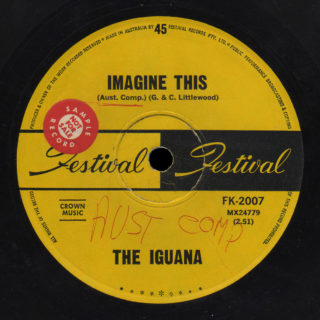

 This unknown group recorded one of the strangest versions of Jessie Hill’s “Ooh Poh Pah Doo” I’ve ever heard, titled “Oop-Oop-a-Doo”. Unfortunately there is no name listed under the song writing credits for “Floatin'”, a cool instrumental with sax, piano and some sharp guitar.
This unknown group recorded one of the strangest versions of Jessie Hill’s “Ooh Poh Pah Doo” I’ve ever heard, titled “Oop-Oop-a-Doo”. Unfortunately there is no name listed under the song writing credits for “Floatin'”, a cool instrumental with sax, piano and some sharp guitar.



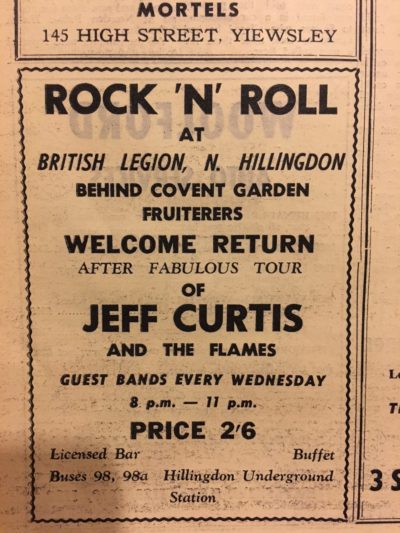
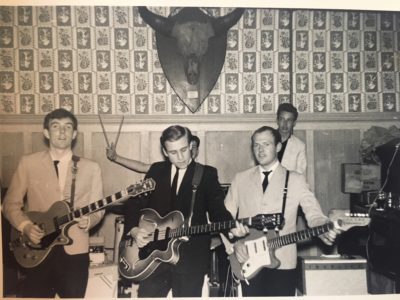










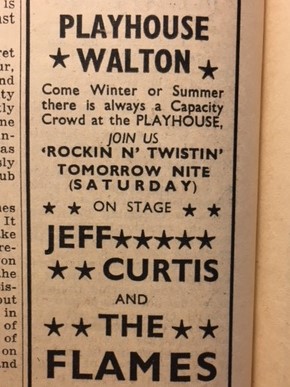



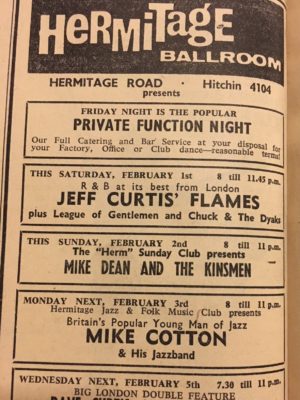



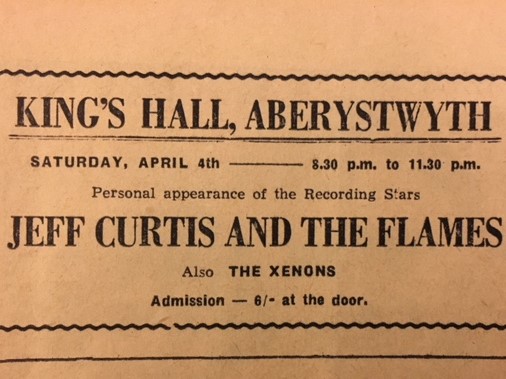

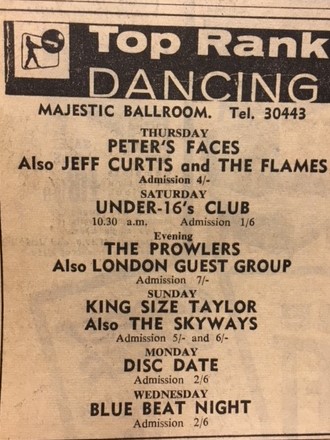
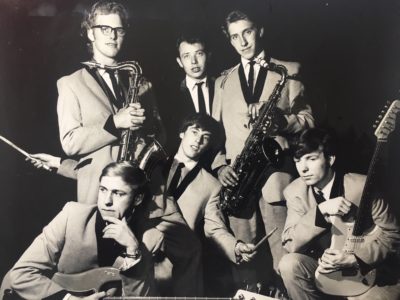
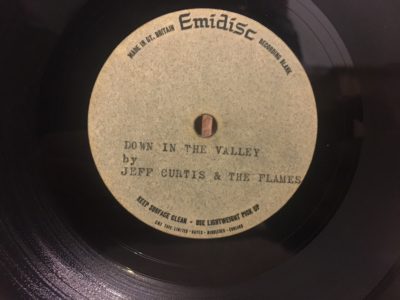
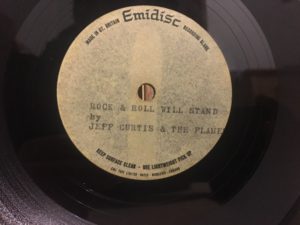

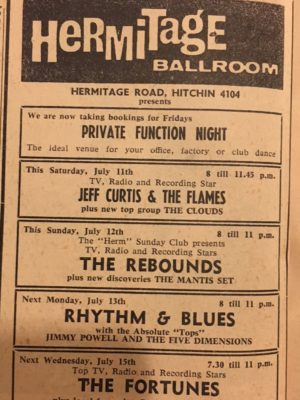
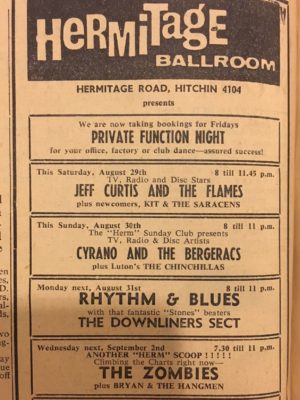
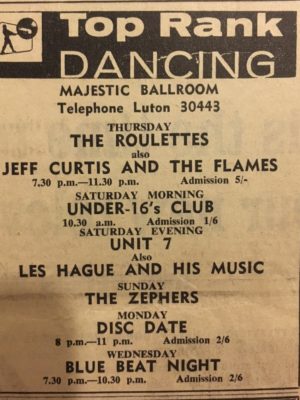

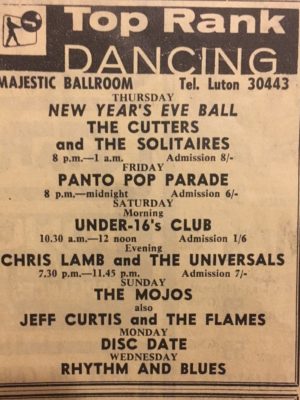

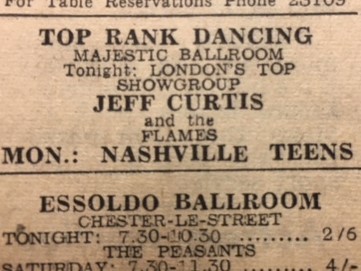
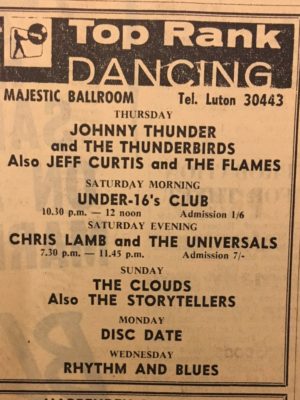








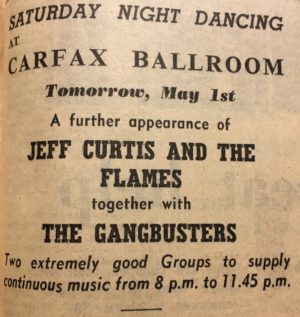
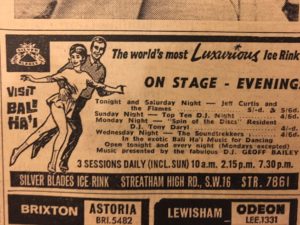
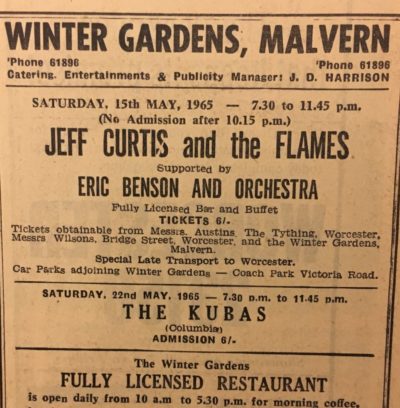



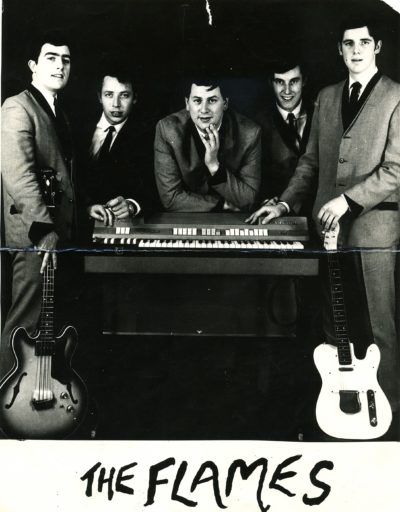






 16 December 1965 – Ealing Club, Ealing, London
16 December 1965 – Ealing Club, Ealing, London